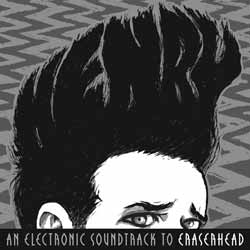|
Click here to return to the main site. Soundtrack Review
Rescoring an old film is nothing new, Gorgio Moroder famously did it utilising several guest artists to create a new score for Fritz Lang’s Metropolis (1927). Outside of professional composers’ non-professionals have engaged in musical synchronicity, pairing, sometimes with variable success, film visuals with different music tracks. The most famous, without doubt, would be Dark Side of the Rainbow, which paired certain portions of The Wizard of Oz (1939) with Pink Floyd’s Dark Side of the Moon (1973), a project which nearly works, if you ignore the fact that most of it does not synch well. I mention this to point out that reinterpretation is nothing new, so it was with interest I sat down to listen to Cat Temper’s - Henry: An Electronic Soundtrack to Eraserhead, a reinterpretation of the film's score. Eraserhead was David Lynch’s first full feature whose surreal story hovers between dark comedy and horror. The original soundtrack was an influential mix of dark, ominous rumbles mixed with industrial sounds to create an abstract soundscape. It’s a brave man who takes on such an important score. There are some practical problems with replacing a film's soundtrack. There are numerous DVD’s and Blu-rays which allow you to play the score only, but off the top my head I cannot think of a release which allows you to strip the music out, to listen only to the actor’s performance. You certainly can’t do this with Eraserhead. Temper's solution is to mute all the sound on the disc, turn on the film's subtitles and synch the new soundtrack with the film. Instructions how to achieve this are provided with the score. The down side of this is that it fundamentally turns Eraserhead into a silent film, a little odd for a movie which came out in 1977. Instead of the industrial soundscape of the original film, Temper has produced a synth heavy reinterpretation. Offering up thirty tracks in all, the music works best with the film, rather than as an album, which is not unusual for film scores. Soundwise, the music seems to owe a lot to eighties synth music, with lots of experimental tones and rhythms. At times it veers towards the original score, but for the most art it keeps its own identity. Of course, regardless of what you feel about a reimaging of the score the acid test is, does it work? For the most part the answer is yes. Its an interesting take on the film, even though it does reduce the original to effectively a silent movie. 7 Charles Packer |
|---|
